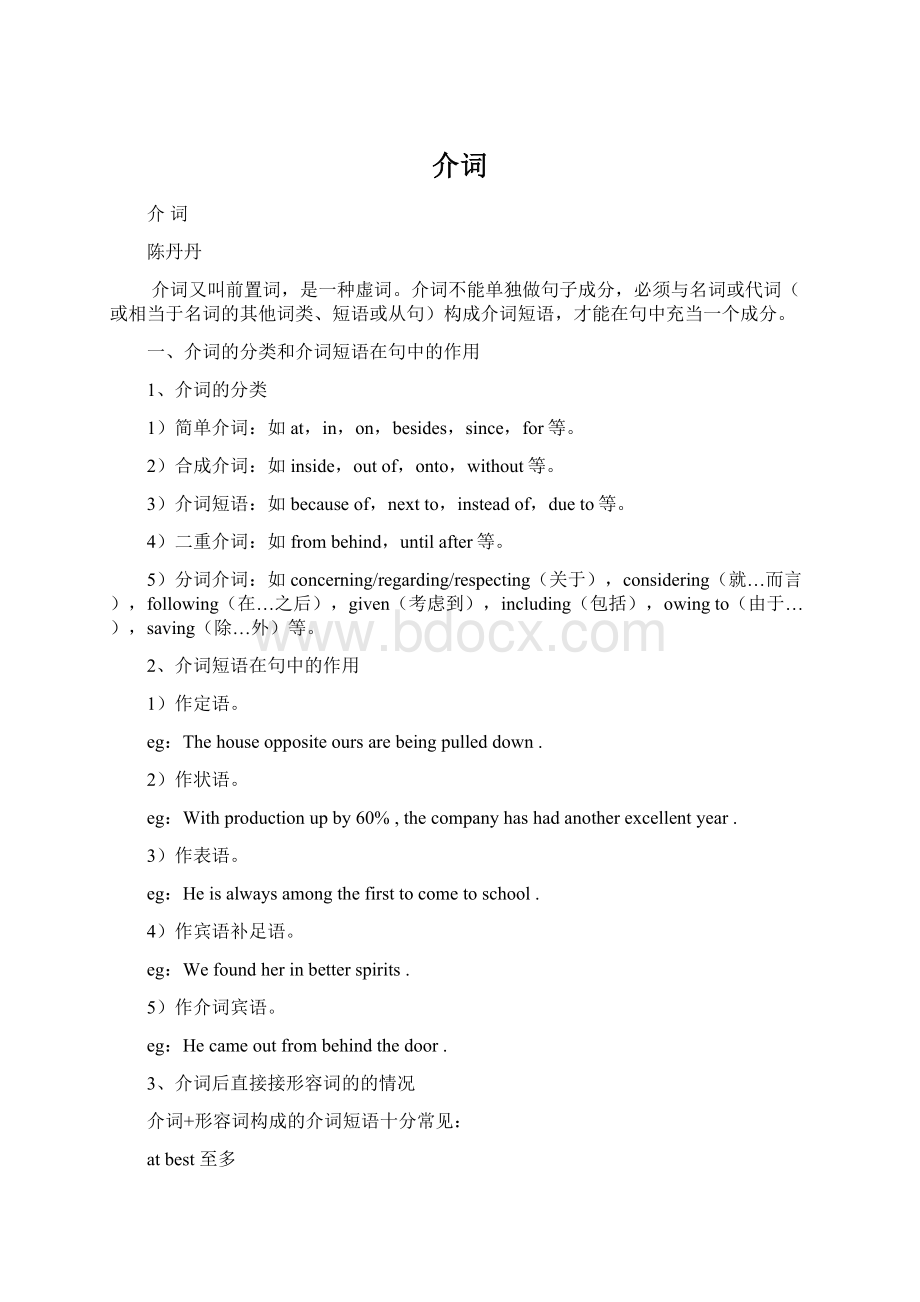介词Word下载.docx
《介词Word下载.docx》由会员分享,可在线阅读,更多相关《介词Word下载.docx(12页珍藏版)》请在冰豆网上搜索。

3、介词后直接接形容词的的情况
介词+形容词构成的介词短语十分常见:
atbest至多
atpresent目前
forgood永远
inbrief简言之
在句中,介词后接形容词通常加上being。
Hewasdismissedfromhisjobforbeingsbsent-mindedwhileworking.
在现代英语中,某些介词后可省略being直接接形容词。
这种用限于某些含介词的短语,通常比较固定,不能随意套用。
1)anythingbutHeisanythingbutangry.
2)accept…asWeaccepttheconclusionastrue.
3)consider…asWeconsiderthewrieasdisconnected.
4)describle…asShedescribledhercosmeticsurgeryasterrible.
5)farfromHisexplanationwasfarfromsatisfactory.
6)kindofHelookskindofpaleafterhisillness.
7)sortofSheissortofexcited.
8)regard…asDoyouregarditasnacessaryIshouldcome?
9)take…forgrantedItookitforgrantedthatyouwouldstaywithus.
【说明:
在regard…as后还可接介词短语和分词。
Heregardedtheaccountoftheaccidentasofverylittlevalue.】
4、省略介词直接接名词的情况
当“of+age/colour/height/length/size/shape/volume”等作表语时,通常可省略of,直接接名词。
Theywere(of)thesameage.
5、Itisbraveofyoutodothat.
Itiseasyforyoutodothat.
下列表示人物特征的形容词同of后的名词或代词关系密切,有意义上的主表关系,常与of搭配:
brave,careful,careless,clever,considerate,cruel,foolish,good,honest,kind,nice,right,rude,stupid,silly,thoughtful,wise,wrong
Itwasverykindofyoutocometohelpme.=Youwereverykindtocometohelpme.
下列表示事物性质的形容词同for后的名词或代词关系不密切,没有意义上的关系,但在句中的不定式结构关系密切,有意义上的主表关系,常与for搭配:
easy,hard,heavy,necessary,impossible,possible,important,difficult
Itishardforhimtogetridofhisbadhabits.=Forhimtogetridofhisbadhabitsishard.
二、注意几个常用介词的用法
用法
常用介词
1、表示时间
at,in,on,by,for,through
2、表示在附近
near,by,beside,at
3、表示地点
at,in,on
4、表示除外
besides,except,exceptfor,but,butfor
5、表示方位
in,to,on
6、表示“经由,通过,穿过”
across,by,through
7、表示“在…上/下”
above,below,over,under,on,beneath
8、表示方式
by,through,with
9、表示原因
through,with,from,for,at,owingto,dueto,becauseof,onaccountof,thanksto
10、表示价格、比率、对比
at,by,for,against
11、表示属性、特征
of,with
12、表示比较
as,like,inspiteof,despite
at,in,on,by,for和through表示时间区别:
at指时间表示;
1)时间的一点。
时刻等。
Theycomehomeatsunrise(atnoon,atmidnight,atteno'
clock,atdaybreak,atdawn).
2)较短暂的一段时间。
可指某个节日或被认为是一年中标志大事的日子。
HewenthomeatChristmas(atNewYear,attheSpringFestival,atnight,atmidsummer).
in指时间表示:
1)在某个较长的时间(如世纪、朝代、年、月、日、季节,以及泛指的上午、中午、下午和傍晚等)内。
Hewasbornin1942.
2)在一段时间后。
●一般情况下,用于将来时间时,谓语动词为“一时性的动作”,in作“在…以后”解。
Theseproductswillbeproducedinamonth.意指“一个月内”。
●after用于将来时间时也指“一段时间之后”,但其后的时间是“一点”(如:
aftertwoo'
clock),而不是一段。
on指时间表示
1)具体的时日或特定的时间,如某日、某节日、星期几等。
OnMay4th(OnSunday,OnNewYear'
sday,OnChristmasDay),therewillbeacelebration.
2)在某个特定的早晨、下午或晚上。
Hediedontheeveofvictory(胜利前夕).
3)准(时),按(时)。
Ifthetrainshouldbeontime,Ishouldreachhomebeforedark.
by指时间表示
1)不迟于,在(某时)前。
Hemusthavereturnedbynow.
2)在…间,在…的时候。
Heworkedbydayandsleptbynight.
for指时间表示
1)(年、月、日、时等)…之久。
Hewasabsentfromschoolforaweek.
2)指定的时刻。
TheoperationwasfixedforFriday.
through指时间意为“从…开始到结束”时,含义同throughout:
Heguardedusallthroughthenight.
辨析:
near,by,beside,at表示“在…附近”的区别;
near表示相对的“近”,实际距离可能还很远。
SuzhouisnearShanghai.
by和beside都表示“靠近”,实际距离不可能还很远,但beside比by更具体地表示出“在…旁边”的意思。
Hewassittingbesideher.
at也有“在旁边”的意思,但多表示有目的的行为为所处的位置,而by和beside仅表示位置关系。
Thestudentsaresittingatthedesklisteningtotheteacher.
从位置的意义上说,near,by,at表示的实际距离一个比一个近。
】
at,in和on表示地点的区别:
at表示地点
1)用于指较小的地方:
Ishallwaitforyouatthestation.
常见用at表地点的短语有:
atthestop,atthedoor,atthetrafficlights,atthedesk,atthetop/bottomof…,attheendof…等。
2)用于门牌号码前。
Helivesat115FuzhouRoad.
in表示地点:
1)用于指较大的地方或指在里面。
HelivesinShanghai/inthecitycentre.
2)虽然在很小的地方,如果说话人住在那里,也可以用in。
商店、机关、学校等,若看作一个地点(point)用at,若看作一个场所(place)用in。
比较:
Imethimatthepost-office.
I’mnowworkinginthepost-office.
on表示地点,一般指与面或线接触:
1)意为“在…上”。
Thepictureswashangingonthewall.
2)意为“在…旁边”。
Helivesinahouseontheriver.
3)意为“在…(里)”。
HelivesonFifthAvenue.
说在某单位工作、某地用餐时,人们把那个场所看成一个点,因此用at。
说在书的某页用on,但说在报上,在书里用in。
besides,except,exceptfor,but,butfor的区别:
besides表示“除了…以外,还有”,即把前后两个部分加起来组成一个整体,相当于inadditionto/including/togetherwith等。
BesidesMr.Wang,wealsowenttoseethefilm.(王先生也去了。
)
注意:
besides用于否定句中时,与except,but同义。
Wehavenootherbooksbesides(except)these.
except的用法应注意以下几点:
1)表示“只有…除外”,即从同类的人或物中扣除,相当于notincluding/butnot等。
WeallwenttoseethefilmexceptMr.Wang.
【注意:
有时exceptfor也能用于这类句子中。
EveryonewastiredexceptforJohn.】
2)后可接名词性从句、状语从句、副词、介词短语或不定式。
接名词性从句
Iknownothingaboutthatfellowexceptthathelivesacrossthestreet.
②接状语从句
Mymotherusuallygoestoworkbybikeexceptwhenitrains.
③接副词
Welookedeverywhereexceptthere.
④接介词短语
Igetupearlyeverydayexcept(on)Sunday.
⑤接不定式:
except后的动词不定式带to或不带to,主要取决于except前是否含有动词do。
试比较:
Marydoeseverythingexceptwashthecar.
HoweverIdon'
tknowwhatIcandoexpectagreetoyouridea.
Itwasnoeffectexcepttomakehimangry.
Thewindowswereneveropenedexcepttoairtheroomforafewminutesinthemorning.
3)except用在句首时,往往后面要加上for。
Exceptforthis,everythingisinorder.=Everythingisinorderexceptthis.
exceptfor意为“除了有…之外”,被排除的部分不属于同类的人或物,而是部分地修正句子的主要意思。
Thecompositionisverygoodexceptforanewspellingmistakes.
exceptfor还有“要不是(因为…)”的含义,相当于“ifitwerenotfor”。
Shewouldleaveherhusbandexceptforthechildren.】
but意为“除了”,与except同义,except强调被排除的部分,but则强调整句的内容,常修饰否定意义的代词或疑问代词。
WhowoulddosuchathingbutJack?
butfor意为“要不是”,常用于虚拟语气。
Butfortherain,wewouldhaveapleasantjourney.
in,to和on在方位名词前的区别;
in表示在某范围之内;
GuangdongliesinsouthofChina.
to表示在某范围之外的地方;
FujianliestothesouthoftheJiangsuProvince.
on表示“毗邻”、“接壤”。
MongolialiesonthenorthofChina.
across,by,through的区别:
across作“穿过,跨过(从一边到另一边)”解,指横过一个平面或一条直线,或静止的对面的位置,相当于“fromonesidetotheotherof,ontheoppositesideof”。
Katewentacrossthestreettomakesomepurchases.
by作“经由,取道,通过”解,表示移动的方向。
Herosequicklyandwentoutbyotherdoor.
byair乘飞机byland从陆路bysea从海陆bywater从水路
through作“从…通过,穿过(从这一端到另一端)”解,指通过一个三维的或被看作是三维的空间。
Thesunlightwascominginthroughthewindow.
above,below,over,under,on,beneath的区别:
above“在…之上”;
“高于…”(表示相对高度,不一定在正上方),其反义词是below。
Abirdisflyingabovethewoods.
over“在…之上”(表示垂直之上或表示附于某物之上并将之遮住),其反义词是under。
有时,over意为“从…上方(越过)”。
Thereisalampoverourheads.(指头顶上方)
Spreadisclothoverthetable.(指附于某物之上)
Thedogjumpedoverthetable.(指越过)
WilliamPorterisbetterknowunderhispenname“O.Henry”.(用于比喻意义)
above,below还可用指位置、职位、程度、价值、品德或年龄高于或低于提及的人或物。
Thetemperaturewasonlyadegreeabovezero.
on“在…之上”(表示与表面接触)。
Heputamaponthedesk.
beneath表示位置(几乎)紧接触在某物之下:
Theearthfeltsoftbeneathourfeet.
by,through,with表示方式、方法、手段的区别:
by表示方式、方法,手段的用法
1)表示以一般的方法或方式:
Weoftenmetbyappointment.
说明:
表示以某种方式行事,名词前不加定冠词。
byweight(按重量计的方式)
byauction(以拍卖的方式)
byvolume(按体积计的方式)
bycontract(以承包的方式)
2)表示传达、传递的方式或媒介:
Howdidyousendtheletter,byairmailorbye-mail?
byexpress以快邮
bypost用邮寄
byletter用信件
byradio以无线电
3)表示用交通工具、通讯工具,后接名词单数,不加冠词:
Hecamebytrainbuthiswifecamebybus.
注意下面两个句子的区别:
Didyoucomebytrainbuthiswifecamebybus.
Theycamebyairandleftbyship.
through表示媒介、方法、作“以”、“通过”、“经由”解:
Hesucceededthroughhardwork.
with表示方式、方法,手段的用法;
1)表示行为方式,意为“以”、“带着”、“用”:
Youwillgetoverthatwithpractice.
2)表示使用具体的工具或手段:
Hewriteswithapen.
在表示通过某种手段或方式时,by和through有时可通用,但by的意思更明确,用得更普通。
当through所表达的意思超过一般的媒介手段(如上例中的throughafriend=bytheinfluenceofatired)时,就不能换用by。
在表示手段时,by,through,with有时也可换用,但with的意思更明确。
Through/By/WithhiseffortsEdisonsucceededinmakingsomanyusefulinventions.
3)with引起的复合结构表示状态、境况等。
介词短语,现在分词
with+名词或代词+过去分词,不定式+句子
形容词,副词
简单介词:
through,with,from,for,at表示原因的区别:
through表原因,作“因为”解,常和neglect,carelessness,mistake,fault等连用,表示偶然或消极的原因,如疏忽、过错、不慎等:
Hecuthimselfthroughcarelessness.
with表示原因,指由于外界影响到内部,意为“因为”、“由于”:
Thelittlegirlwasshiveringwithcold.
from表示动机、疲劳、痛苦、死亡等原因:
Shediditfromasenseofduty.
for常表示为了某一目的、事因:
Forgivemeforkeepingyouwaiting.
at表示原因,指“当听到、看到、想到”等:
Shelookedsurprisedatseeingus.
介词短语:
dueto,owingto,becauseof,onaccountof,thanksto表示原因的区别:
dueto常用作表语,现代英语中也可以用作状语。
ThatShellybecameapoetmayhavebeenduetohismother'
sinfluence.
owingto多用作表语。
Owingtohislackofexperience,Johnfailedtodotheworkwell.
becauseof和onaccountof常用作状语,不用作表语。
Becauseofherbadlag,Janecouldn'
twalkasfastastheothers.
但若主语不是一个名词而是一个事实,becauseof和onaccountof短语也可作表语。
Westayedathome;
thatwasbecauseofthesnow.
thanksto只用作状语,不用作表语。
Thankstoyourkindhelp,wefini